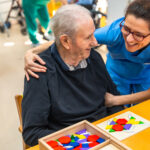Autism spectrum disorder (also known as ASD) is a developmental disorder that commonly involves problems with communication and social interactions.
ASD is the umbrella term that covers autism, Pervasive Developmental Disorder (PDD), Pervasive Developmental Disorder – Not Otherwise Specified (PDDNOS) and Asperger’s syndrome.
It is important to know that ASD can be mild, moderate or severe. Therefore no two children with ASD are the same, despite sharing similar problems.
ASD is referred to as a spectrum because there is a wide range of features among different people with ASD.
Children with mild symptoms are often referred to as ‘high functioning’.
ASD is a lifelong disorder without a cure. However, early intervention such as therapy and support can successfully help children with ASD to reach their full potential.
Signs and symptoms of Autism
ASD tends to provide difficulty in two main areas:
- Communication and Social Interaction
- Abnormal behaviours, activities and interests
Communication and Social Interaction
Many children with ASD display poor communication skills or focus their communication towards objects instead of people. some children with severe ASD are not able to speak at all.
There are many children with ASD who have normal language skills but may still display problems with social interaction. You may find that their conversations are one-sided, they may make up their own language (also known as neologism), or they tend to repeat certain words and sounds (also known as echolalia).
Most children with ASD have difficulties reading body language and other non-verbal cues (this includes understanding emotions expressed through tone of voice and facial expressions). These children are likely to struggle with complex languages, such as sarcasm, and are therefore more likely to take what is said literally. Another area that is difficult for children with ASD is eye contact.
Taking the above into consideration, children with ASD may have different and unusual ways of socialising. They may only interact with people when they need to, or they may actively engage in conversation that’s only about their interests.
Abnormal behaviours, activities and interests
Repetitive behaviours, limited interests and an insistence on routine are common in children with ASD.
You may also notice that a child with ASD often lacks creativity and imaginative play. Smelling, tasting or staring at toys may also be preferred rather than playing with them. You may also notice repetitive or obsessive actions is preferred – such as placing toys in a line or continuously spinning the wheel of a car.
Children with high-functioning ASD can also become very interested in one topic, often excluding other activities or interests.
It is also common for children with ASD to be oversensitive or undersensitive to everyday sounds and/or textures. Repetitive movements are also typical of children with ASD, such as spinning around in a circle, headbanging, hand-clapping/flapping and poor coordination. They may even prefer to walk on their toes or adopt unusual postures.
Other difficulties that children with ASD may have include:
- Sleeping problems
- Anxiety
- Restricted eating patterns
- Learning difficulties
- Attention difficulties
- Emotional difficulties
- Difficulty with planning and organising
Intellectual ability
One main factor that affects how a child with ASD functions and behaves is their intellectual ability (also knows as I.Q). This can range from severely disabled to highly intelligent. The child’s level of ability and intelligence will vary, with areas of strength and weaknesses.
When you should see a doctor
If you are concerned about aspects of your child’s development and behaviour, we recommend seeing your GP and requesting a referral to a specialist paediatrician, psychologist or speech therapist. Alternatively, you can visit a private paediatric neurologist. You mustn’t make a diagnosis yourself.
This is because many of the unusual behaviours that are displayed by children with ASD are often seen in normal toddlers, which can make the diagnosis quite difficult at times. You will find that many specialists will wait until a child is older than three years of age before assessing for ASD, however, if you are concerned and your child is under the age of three, speak to a doctor.
The diagnosis of ASD requires a multi-disciplinary assessment. This means a team – consisting of a paediatrician, psychologist and/or speech therapist – will assess your child. As features vary so much between children, there is no single or simple test for ASD.
Treatment options for ASD
Early intervention is important as it can help your child to reach their full potential.
Seeing a specialist will help to develop a plan of action for the family and can include information resources, strategies and support for helping your child develop.
There are different treatment options which will largely depend on the needs of each child and the nature of their impairment/s. These include:
- Behavioural therapy: a psychologist can help to identify triggers for behavioural outbursts and ways you can avoid/manage these triggers.
- Speech therapy: as most children with ASD have difficulty with communication, speech therapy can be very beneficial. A speech therapist can help children with ASD improve their language and social skills, which will have a positive impact on helping children to interact with their peers.
- Occupational therapy: occupational therapists can help children who are have oversensitive senses (hearing, touch or visual). An occupational therapist can also help children to improve their focus and concentration levels.
- Environmental changes: as children with ASD prefer a structured and predictable environment and routine, visual aids (picture cards) can be very helpful with improving a child’s understanding. It can also help the child to better communicate their thoughts and feelings which can reduce stress.
- Social skills development: an Applied Behaviour Analysis (ABA) therapist works one-on-one with children to help them ‘learn how to learn’, and to help them develop social and communication skills.
Over time, you will find that the needs of your child and family change, therefore your child’s treatment will also need to change to meet these needs.
Feel free to contact us if you have any questions that haven’t been covered in this blog post, or if you would like to speak to a specialist today.





